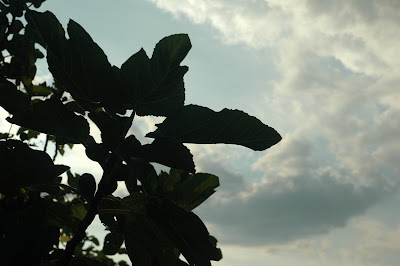
I have been restricting my food intake ever since I was ten years old, when I became tired of teachers and uncles always harping on me to eat meat. As long as I could remember, the taste of meat and seafood was abhorrent to me, hot-dogs and chicken nuggets aside. I have horrible memories of my kindergarten teacher begging me -- nay, forcing me, almost -- to eat a fried fish stick for lunch one day. I gulped it down in two bites, hating her for making me eat something so repellent to my taste buds. (In retrospect, I think that the problem may have been a lack of exposure to good quality meats and fresh seafood, living in the Midwest, and less an inherent dislike of animal products.)
In order to gain control over what I put in my mouth, I decided to become vegetarian and persisted at it, despite my parents' consternation and the criticism of other adults, for nearly eight years. At seventeen, I became an exchange student to Chile and, along with a desire to embrace a new culture and all things that came with it, I decided to start eating meat again. My first meal was, ironically enough, fried fish -- but nothing could be less like the fish sticks of my childhood. Chile has been blessed with one of the world's longest and most fertile coastlines, and their seafood is extraordinary. The fish I ate was a white-fleshed
merluza, battered in eggs and flour and parsley, fried on the grill (
a la plancha), and served with a wedge of lemon.
Fresh fried fish can make a convert of any vegetarian, and I fell for it hook, line, and sinker.
Since then, I have often felt beguiled by the prospect of restriction. For a period, I avoided anything with sugar or processed sugar, spurred on by the book
Sugar Blues. In college, as I stumbled into my eating disorder, the categories encompassing restricted foods became larger and larger: first no whole milk, then no dessert, then no caloric beverages, then only veggies and yogurt for dinner. At the height of my restriction I tipped into bulimia, and have spent the years since emerging from that particular compulsion. In the meanwhile, my digestive system tied itself in knots, and I emerged completely unable to digest wheat and other glutenous grains until this fall.
So now is the first time that I have not restricted my food for nearly 15 years. And I am facing the prospect of yet another restriction, one which I am ambivalent towards: taking caffeine out of my diet.

At the worst point of my restrictive eating, I used caffeine to give me the energy that I was not willing to get from calories. I frequently drank caffeinated beverages before meals in order to stave off my desire to eat and postpone the meal itself. In recovery, I relied on caffeine as a sugar substitute: that is, when my body wanted to binge on sweets, I drank coffee instead, or bottles and bottles full of diet soda, willing my body to
stop wanting sugar. It may have worked at the time, but it left me with a potent caffeine addiction that I have had a difficult time weaning my way out of.
The reason that I am considering doing so now is that my breasts have felt tender and rather lumpy lately. I had everything checked out through the proper channels this week; my symptoms are benign so I'm not going to make a will any time soon. But the bad news, if it can called bad, is that this
discomfort may be due to my high caffeine intake. And here we go again: to restrict or not to restrict. No coffee? No black tea? No
chocolate? (I suspect that the last one is going a bit far -- how much caffeine can there possibly be in an ounce of chocolate?)
I have a few thoughts about this. The first is "Oh, yay, now I can finally have a good reason to end my energy dependence on foreign fuel." Caffeine makes me jumpy and irritable, interrupts my concentration, and turn me into an insomniac. I'm not sure what the upside is to it. But my second thought is "Waaaaaaaaaaaaaiiiiiiiiitttttt a second. W-w-w-what? No caffeine? Ever? Again? How am I going to get through graduate school?" That is my instinctive fear: that I will have to end something, to let something go that I am not ready to say good-bye to. Addictions are never easy to relinquish, but to make matters worse, I live in a city with a Starbucks on every other block.
And my third thought?: "My breasts are definitely worth it."

I'll take it slow, go cold turkey for now, and then see how a cup (no more) of joe affects me from time to time. But there will be no drastic end to the chocolate: the caffeine in chocolate is miniscule
in comparison with coffee and tea, and I'm sure that a chocolate cookie from time to time would be just what the doctor ordered...
Note: None of my own images this time around. Click on them and you will be re-directed to their Flickr pages.
 Today I had the fortune of having lunch with a woman whom I met through this larger world of blogging, and I must say that, as she was the second person to have stepped out of my computer and into my life, that the experience quite agrees with me. Thanks, Emily Jolie.
Today I had the fortune of having lunch with a woman whom I met through this larger world of blogging, and I must say that, as she was the second person to have stepped out of my computer and into my life, that the experience quite agrees with me. Thanks, Emily Jolie.















